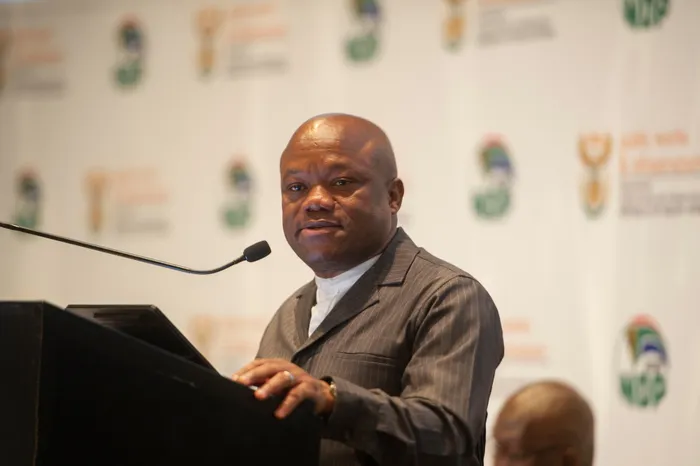South Africa deepens ties with Afreximbank to boost infrastructure and intra-African trade

Deputy Minister of Public Works and Infrastructure Sihle Zikalala on Friday said the relationship between South Africa and Afreximbank has “evolved significantly” since 2021, with the two parties now working closely on project preparation, trade promotion, and sub-sovereign financing.
Image: Armand Hough / Independent Newspapers
South Africa’s partnership with the African Export-Import Bank (Afreximbank) has strengthened considerably in recent years, paving the way for deeper collaboration on infrastructure development, trade facilitation, and industrialisation across the continent.
Speaking at the Farewell Conference and Investiture Ceremony being hosted by Afreximbank on Friday, Public Works and Infrastructure Deputy Minister Sihle Zikalala said the relationship between South Africa and Afreximbank has “evolved significantly” since 2021, with the two parties now working closely on project preparation, trade promotion, and sub-sovereign financing.
“Afreximbank has become a key partner for South Africa. Our relationship began to deepen around 2021–2022, following their introduction of the Intra-African Trade Fair in 2018, which they coordinate alongside the African Union and the AfCFTA Secretariat, ” Zikalala said.
“We hosted the second edition in Durban after COVID-19, and it was a great success — attended by over 10 African Heads of States.”
Zikalala highlighted that one of the key outcomes of the collaboration has been exploring how provinces and municipalities — or “sub-sovereign entities” — can access Afreximbank funding directly for infrastructure and industrial projects.
“They have been instrumental in supporting private-sector-sponsored projects,” he said. “A good example is the Nyanza Titanium project in the Richards Bay Industrial Development Zone.”
He added that the recent progress made by Finance Minister Enoch Godongwana in accelerating South Africa’s ratification as a full sovereign shareholder in Afreximbank would unlock even greater opportunities.
“Now that South Africa is becoming a full affiliate of the Bank, it opens more space for entities to source funding and for Afreximbank to partner directly with government,” Zikalala said.
Zikalala said the Department of Public Works and Infrastructure (DPWI) had signed a Memorandum of Understanding (MoU) with Afreximbank focused on project preparation — including feasibility studies, business plans, and environmental permits — to ensure that major infrastructure projects are bankable.
“At present, Afreximbank has already committed over R90 million to project preparation for Infrastructure South Africa. We’re now working to scale that up,” he said.
He added that Afreximbank’s involvement would help “alleviate fiscal pressure” on government at a time when the national budget remains constrained.
“Partnering with institutions like Afreximbank and the African Development Bank gives us more funding options to drive infrastructure development,” he explained.
According to Zikalala, Afreximbank’s focus on supporting manufacturing, innovation, and intra-African trade aligns perfectly with South Africa’s industrial transformation goals.
“The Bank is big on supporting entrepreneurs in the manufacturing sector, ensuring they receive export finance and market access,” he said. “Their emphasis on shifting Africa’s economy from exporting raw materials to exporting finished goods is exactly the kind of transformation we need.”
He noted that many South African entrepreneurs previously struggled to access Afreximbank's support due to the country not being a full member. “That barrier will now fall away,” he said.
Zikalala reaffirmed government’s ambition to make South Africa “a construction site”, with infrastructure as the driver of post-pandemic recovery.
“President Ramaphosa’s Economic Reconstruction and Recovery Plan identified infrastructure as the flywheel of growth,” he said. “We have launched an Infrastructure Book detailing all catalytic and mega projects, and we’re coordinating closely to ensure their delivery.”
He emphasized that infrastructure development must also support localisation, ensuring that materials, tools, and equipment used in construction are manufactured locally to create jobs and stimulate industry.
Zikalala concluded that working with African institutions like Afreximbank offers clear advantages compared to traditional global lenders.
“These are African institutions built to serve African interests. They support both governments and entrepreneurs with fewer policy constraints and a shared vision for the continent’s development. Their approach helps us build one common African agenda,” Zikalala said.
“When we think of development, we must look beyond our borders. South Africa’s market of 62 million people is small, but when we expand to the continent, we gain scale, access, and opportunity. That’s why working with partners like Afreximbank is essential for the future of Africa’s growth.”
BUSINESS REPORT